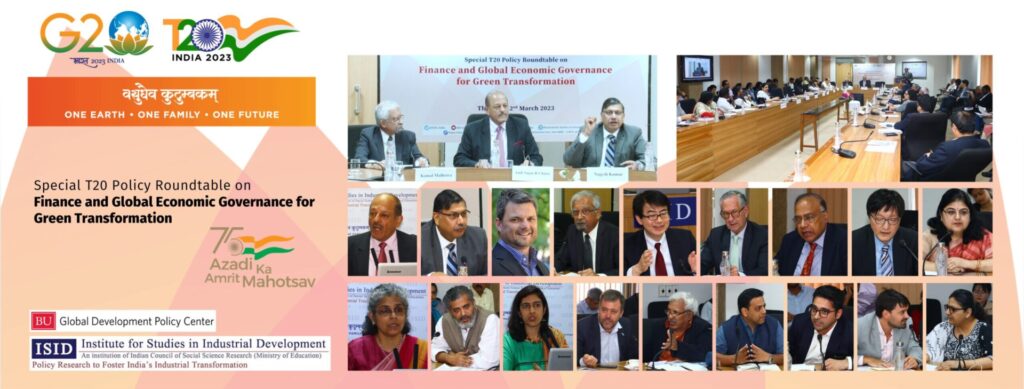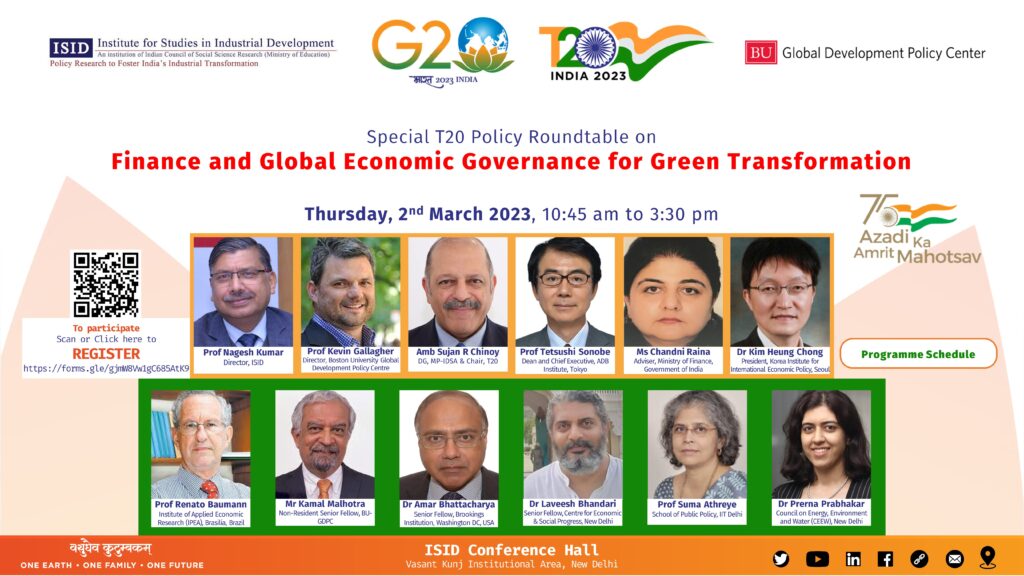ISID and the Global Development Policy Centre of Boston University (GDPC-BU) organised a Special Policy Roundtable on “Finance and Global Economic Governance for Green Transformation” in collaboration with the T-20 Secretariat, at ISID campus on 2nd March 2023. The roundtable focused on the reforms required in the global financial architecture and international trade rules for facilitating green industrial transition. Ambassador Sujan R Chinoy, the Chairperson of T-20 and Director General of Manohar Parrikar Institute for Defence Studies and Analyses (MP-IDSA), delivered the inaugural address. The first session, focusing on financing for clean transition and global financial architecture, was conducted by a panel consisting of Prof Kevin Gallagher, Director, GDPC-BU; Prof Tetsushi Sonobe, Dean and Chief Executive, ADB Institute, Tokyo; Dr Amar Bhattacharya, Senior Fellow, Brookings Institution, Washington; Ms Chandini Raina, Advisor, Ministry of Finance, Government of India; and Dr Laveesh Bhandari, Senior Fellow, Centre for Economic and Social Progress, New Delhi; and moderated by Prof. Nagesh Kumar, Director, ISID. The second session, dealing with multilateral trade rules for green industrial transformation, was led by a panel consisting of Prof Nagesh Kumar, Director ISID; Dr Kim Heung Chong, President, Korea Institute for International Economic Policy, Seoul; Prof Suma Athreye, School of Public Policy, IIT Delhi; and Dr Prerna Prabhakar, Council on Energy, Environment and Water, New Delhi; and moderated by Mr. Kamal Malhotra, Non-Resident Senior Fellow, GDPC-BU.
Concept Note
It is now widely recognized that clean transitions and net zero goals will require a staggering magnitude of resources, clearly beyond the capacity of most developing countries. The global community has found it challenging to keep the commitments on development finance—whether the 0.7 percent official development assistance (ODA) target or US$100 billion in climate finance annually agreed at the United Nations Framework Convention on Climate Change (UNFCCC). Identifying potential new sources for closing the financing gaps that developing countries face is an important challenge for the international community, especially given the limitations of fiscal space in the industrialized countries to meet them. Against that backdrop, the Special Think-20 (T20) Policy Roundtable will review the new and innovative sources of climate finance for developing countries. Among other sources, it will also review the case for a new international financial transaction tax which has the potential to generate substantial annual revenue, hurting no one while also helping to moderate the volatility in the capital and foreign exchange markets which has been highly disruptive for emerging countries. It will also discuss the proposals for reform of global financial architecture represented by the Bretton Woods Institutions for dealing with the needs of the present-day challenges, especially for supporting sustainable development and clean transition.
Furthermore, developing countries as late industrializers need to be supported in their clean energy transition and sustainable industrial transformation through supportive multilateral trade rules that facilitate their access to environmentally sensitive technology (ESTs) on affordable terms, including through reviews of the Agreement on Trade-Related Aspects of Intellectual Property (TRIPS). They also need to be supported in building productive capacities for their clean transition through policy flexibilities that have been extensively exploited by industrialized and newly industrialized countries in the process of their industrial transformation such as domestic content regulations. Some of these policy spaces have since been eroded under the multilateral trade rules such as those covered by the Agreement on Trade-Related Investment Measures (TRIMS) of World Trade Organization (WTO). What kind of reforms of global trade rules and policy flexibilities are needed for facilitating clean energy and industrial transition?
The Special T20 Event organized by the Institute for Studies in Industrial Development (ISID) and the Boston University Global Development Policy (GDP) Center aims to discuss these two broad themes in its two substantive sessions respectively. T20 Co-chairs from Taskforces (TF) 1, 4, 5, 6, and 7 along with other experts, will engage in interactive discussions at this Special Event to find some answers to these important issues. The organizers will issue a report based on the discussions summarizing key recommendations.
For more details, please contact Dr Reji Joseph at ISID [email protected]; or Ms Samantha Igo at BU-GDPC [email protected].
Programme Schedule



